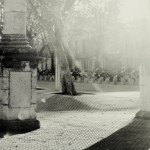My never-ending family story has always been a hard scene in which I am very young and small and terrified. I’m staring at my parents and brother locked in combat. There may be no action, it usually flashes at me in tableau form, but there is plenty of rage, fear and hurt. There is a pause between shouts, threats, perhaps punches, hands at a throat, something grabbed and about to be thrown, once even a gun.
I can see the fixed scene of confrontation, the outbreak of fighting between my father and my brother, who is giving the shout and the fist to my mother’s hoarse rage.
I am in the midst of the fighting but have to hold back.
No one can hear me, though I am trying to be heard, to get them to stop fighting.
I can’t step into the fight because then everything will break apart.
I know I am the only thing holding them and the household together, and I do this by not jumping in, taking sides, joining the fight.
I love them all and don’t want to hurt anyone, I want us to stay together
I am afraid that by getting into it with them, everything will fall apart, I will lose this home, I will be alone, homeless, lost … ?
In the family, everything was at the breaking point in every one of these fights, everything was at stake. I was sure of it. The danger was too great, the need to exert my responsibility to keep them together by not joining in, by not being like them, by not becoming violently angry as they were, was uppermost. The essential thing.
Yet I was afraid and aware only of the fear and my immobility. I felt I was failing, that I was a coward, that I should be stronger, step in and fight – who? my father? Why? because my mother hated him and my brother was following her direction?
I hated myself for acting in this way out of fear that I would lose my home and whatever security there was. I was more aware of fear, cowardliness, failure than anything. It was an impossible situation.
So the pattern was my standing there, dissociated in a way – taking it all in, yet staying back. The people in front of me looked bigger than I felt, more alive, more real. I became invisible. Until my mother turned to me, perhaps in passing as the scene was breaking up and called me a traitor for not defending her.
Later in life, the people and places, of course, were different, but I kept seeing the same pattern. Each time, I had to pause to sense the danger as feelings intensified. I usually had to do something, but often acted through fear, or else through anger when anger was covering fear.
Guided by these feelings, I so readily did the wrong thing, turning away when I wanted to embrace or yelling in anger when I wanted to be close and loving. I easily said the wrong words because I wasn’t listening to myself, or tried to shut down the feelings of others as I had shut down my own.
My instinct was to control from the old pattern, to be the one whose inaction held everything together. I was safe as an observer. I watched what I was doing, evaluating, directing myself to play the scene in a certain way. Each experience tended to be a puzzle, a challenge. How should I approach this? I put a big space, a long pause, between the stimulus and my reaction.
Going through life in this dissociated way became normal for me. It could be useful, but it was also frustrating. If I felt something intensely I forced a space between the inner experience and any outer reaction. I didn’t want people to see me in the immediacy and intensity of feeling. I didn’t want the feeling to take over my body.
I could not change the story easily because it protected me in some ways. For decades it was my unconscious guide, always there to script a scene before I could step into it, before I could live it. That kind of life felt safe but became bleakly unfulfilling. There was little trust. I became wary, alert, using my powers of perception to anticipate and shield myself and those I cared about from the dangers I imagined.
It filled my being so deeply that it became the scene I tried to put myself back in, though I was rarely conscious of what I was doing. It gave me the default stance in any situation. Let the others show the feelings that filled them before sharing any of my own. My sharp senses needed to pick up from them the first hint of anger, fear or contempt – those flashing lights of warning.
I needed the acute awareness, the sensitivity to every shift of a muscle because it was tied to feeling. But I wanted to be aware and relaxed enough to be involved, not standing back, pretending to be a detached mind with no physical presence, a ghost. Yet I was always there, and by not taking part, by remaining silent, I was really shouting in pained discomfort. People looked at me, as if saying: We need you to come closer. We need you to be here. Now.
My never-ending story had an almost magical power. I could break the spell by letting myself say to someone out loud what I was feeling. Then the still scene came to life, and I was a part of whatever was going on. I was no longer controlled or frozen by the spell of a long-ago past. I could choose what I wanted to do and say, feel what I needed to feel. Open my eyes to see that the people around me were not my old family, stuck in anger without resolution. I could see that the original family story had ended long ago, and there was no use in repeating it over and over again.
Breaking the power of that story was one of the first steps in healing, yet its power was so strong and resilient that I had to keep breaking it many times. I can still find myself behaving as if I were part of the same family scene I grew up with. A big part of the work of staying well is maintaining my awareness of its shadowy influence.
Do you have a never-ending family story that still shapes the way you relate to people? How have you dealt with it?




The story really hit me hard. Many children grew up in an unhealthy environment and it really affected them up until they become adults. The trauma, fears and even though they say that time heals, it is still hard to forget.
families are tough – there is a time to get involved and a time to walk away
Thank you for giving me language for what I experienced for many years. The dissociation you describe, though arising from a difference source, blocked full participation in life. I’ve moved on, but having words for it will help me move much further, and I am very grateful to you.
Hi, Susan –
I’m glad this post was helpful. It’s good to know you’ve moved on, and I’m sure you’ll continue to do so.
Thanks for your comment.
John
Oh, John – I would probably describe my family story in much the same way only I never had all the words. I lived so much of my life in a dissociated state out of fear and feeling that I had to be the rational one to keep everyone together. I know I was taking care of my siblings when my mother couldn’t when I was five years old. I don’t remember it, but there was no other way we could have gone on.
A lot of that story is still going on, unfortunately, because my dad still has his rage and my mother her narcissism. What’s complicating things now, though, is that they are aging, of course, and my mother recently had a stroke and has become a rather vulnerable little old lady – as long as she’s like this, my dad will probably not explode at her. However, he’s also mellowed a bit and is affectionate like he never was when we were younger and it’s almost like I don’t know what to do with it. He still scares me, yet I’m finding compassion for both of them that brings up tons of grief and anger. I’m in awe that you’ve been able to get to the other side and I can’t help thinking, “why, oh why, can’t I?” We all have our own process, I know, but you’ve described it well – the never-ending story! Perhaps some day….
Hi, Judy –
It’s never easy. I think it was possible for me to “get to the other side” only after my parents, especially my mother, died. The entire period of recovery, as I think about it, occurred following her death, over ten years ago. She changed a lot at the end, though she also had psychotic breaks, as well as dementia, so I was never sure who I would encounter when visiting in the last couple of years. There was time for “discomfirming experiences,” as the psychotherapists say you need to have, to show how wrong-headed the original story was.
John
Oh my goodness, what a story! As always, you describe it in a way that I felt that I was right there.
My own family situation was not nearly as negative or dramatic and yet I am sure that if I think about it there are patterns that I learned (or taught myself) as a child that are not effective. You have given me something to think about.
Your story reminds me of a favorite quote “children are excellent observers of life but poor interpreters” (I think it came from David Seamands’ book ‘Healing for Damaged Emotions’). The child you were saw and heard what you did and came up with your own response without help, or wisdom or maturity…. pretty scary.
Thanks for this insightful story.
Hi, Wendy –
I’ll have a look at the David Seamands book. Children interpret in a very self-centered way, which is only natural. Certainly not accurate interpretation, but they do come up with an explanation that gives their world clear meaning. Taking responsibility on yourself makes sense since you are the one person you have the most control over. It is very scary.
John
This is very powerful John. Very. I need you to know that seeing and knowing is a huge step in healing. Being able to break such a pattern is incredible. The fear you had to walk through to do it keeps most bound in a cage forever.
Having to break through many times? You may find that you will always have to smash the learned and deeply ingrained “way it works” “best way to deal” ” keeping the unknown out” patterns.
Think about it! Healthy families raise children to believe in themselves and to know their worth and value. Healthy families raise adults who rely on their “how to’s” based on lessons learned within the dynamics of the family. Their expectations are positive, problems can be solved, pain and fear don’t guide action, emotions are clues about how they feel and, balanced with healthy experiences, make for a person living life, growing, evolving, learning, etc.
What we are raised to believe IS life and IS what our most important people think of us, and what we know from our first years IS what we can expect from others and ourselves all make up how we do what we do. Positive and/or negative. We fall into the family who made us.
So if its not going well we are supposed to see a better way and adopt it as our new lifescript? Can the “healthy” people do that?
No.
They mess up too by the way. They just usually have more positive tools inside them to use to clean up life’s messes.
But the emotionally damaged child grows up with the most scarred sense of self and the most unreliable sense of others and zero comprehension of trust or giving or accepting, and with the most broken tools he/she must transcend and relearn who they are in ways that look truly insurmountable.
I say if you are breaking the glass, John, and if you are seeing when now isn’t then, and if you are searching for new ways to use some new tools that you noticed brought better outcomes…Then you are doing the most incredible thing you can to learn how to change it up and see what happens.
Keep breaking through! Over and over. Every single time you see that now isn’t a rewrite of your childhood is one more Lego block on the rebuilding of you emotional skeleton.
Everybody hug yourself. We are all worth it and we all deserve it.
Now I am going to call that guy I keep expecting to learn to not have to keep breaking through walls as I believed he should have busted them all with #1.
Sometimes compassion gets run over by expectations and forgetfulness that we aren’t all in the same neighborhood even when we are in the same house.
Hi, Eirie –
Thanks for your encouragement. It always strikes me as so frustrating that I still deal with these things this late in life, but you make me realize that many never make a breakthrough. It is necessary to rebuild the person who survives childhood with such a distorted and damaged sense of self and relationships. I’ve spent the last many years learning to use those positive tools you refer to. Definitely call that guy!
You write very well – I’ll look for you on Writer’s Cafe.
John
The feeling of being powerless as a child, when my dad was angry or abusive, did not end when I became an adult. I still don’t understand the dimensions of my power and how to wield it.
Many times my experiences find themselves in the echo of your own. My method of self-protection was also one of placing some fabrication between my emotions and what had happened, what was happening, and what might happen in the future. No, not quite what you were saying, but close enough. At least what you have said helps me see a pattern. I have always written scripts (conversations, poems, role-playing, short stories, observations, descriptions, fiction) about interaction with those I would call my present family. This includes everyone with whom there is a potential for emotional give-and-take. Mom, brother, sis, and three friends, and the occasional interloper. The interloper might be a therapist, for example. Or a stranger who engages me in conversation in line at the grocery store. Someone with whom I can be circumspect about the truth. This way, if I get all encounters and potential encounters written down and thought out and even memorized, I tell myself I can be prepared. I can plan to do something right. And you can quickly see how all of this writing and thinking and analyzing and memorization takes on a life of its own. It just happens to be My Life. It can be quite comforting to have this kind of Life on paper. On paper, I can reason things out, justify, rationalize, become the hero, and find the me I can affirm and approve. A kind of fiction that takes the place of reality. Oh, it’s pathological in some ways, I sense. It might make a great book: the story of the real woman whose life was only on paper. It gets stranger. On paper, you can be your own priest, your own perfect lover, and so on. And never have to deal with the world outside. The world where emotion is. If I ever have emotion, it is a detached emotion. I may cry and have no sense of grief or sadness. I may laugh and have no sense of what was humorous. I think I have programmed myself to be a robot through all this introspective writing. Depression probably happens because of the schism.
Oh. Oh I ache for you. I do.
WritersCafe.org is a pretty cool place to write and, more importantly, to find others who understand and some who also live their lives on the page rather than with others.
Don’t hide and instead write and seek readers and become a person with a little tiny real life that can grow. Go slow for as many years as it takes, but if u can keep the fantasy on the page and interactions with others limited to real you will grow. Find others and don’t give up.
~eirie~
Hi, Donna –
A life on paper – that’s an amazing idea. I doubt I would call it fiction, though, since it’s you living through everything you describe. I’ve tried to “replay” scenes with people, asking them to set aside what I did or said the day or moments before and then tell them what I really mean. But I never wrote anything down. It’s such a strange need – to “get it right” rather than trusting that what works with people is the spontaneous exchange, bumbling and incoherent as it may be. What is it that makes the spontaneity of emotion so hard for many of us? Do you enact the script in person or is it a substitute for the encounter?
John